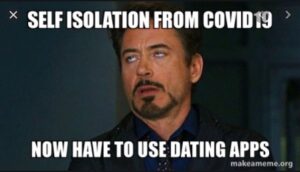Dating Apps in times of Corona – A way back into love?
Defining the scope – Where do we stand?
Paula Bialski’s talk this morning encouraged us to look at our topic of dating apps from another perspective: not only are dating apps a way to seek love, affection and sex, but also can they be seen as a tool to reduce complexity of our daily lives – similar to the idea of techniques like Scrum reducing the complexity of software development as proposed by Paula.
This idea helped us to narrow our topic down to specific elements we want to look at in the context of dating apps. For instance, how dating apps are in fact used to reduce uncertainties and complexity in times of Corona. Additionally – based on the lecturers’ inputs and our own thoughts – we’d like to investigate further how people present themselves via dating apps, if dating apps are in fact used as tools to manage anxieties in the current crisis, how we establish trust in such online settings, what is the intended purpose of using such apps and what other uses evolved throughout time. All these subquestions shall help us to find an answer to the overarching question:
How does the pandemic change the way dating apps organize us?
Today we gained hands-on experience and deep-dived into the subject matter by conducting our chosen empirical approach.
Empirical Approach – How do we tackle the subject?
For the empirical approach, in a first step, we have developed a questionnaire that deals with various aspects of using dating apps. With regard to our interest in comparing usage between past and present, it was not very difficult to develop questions that are aimed precisely at this. We decided to move from general questions to more specific questions related to the current Corona pandemic. Since a public questioning of passengers on the street is a rather inappropriate idea, we will send the questionnaire to friends and acquaintances.
In a second step – the auto-ethnographic part – we used the dating app Tinder ourselves in order to examine how people present themselves and to check if we are able to observe changes compared to the time before Corona. Soon, it became clear that Corona as a prominent topic already took over Tinder: guys use the pandemic as a



humorous element by posing with a bottle of Corona beer; they claim to look for a “quarantine buddy”; or simply utilize the topic as a “hook” for a potential conversation with matches. However, the overall manner of presenting oneself seems to remain the same: creating a desirable image of oneself (of rather one “ideal self”), no matter if real-life dates are in sight or not.
For us it is interesting to approach the phenomenon Tinder from a scientific approach, as it opened up new and fresh perspectives on dating apps. Not having one’s own goals in mind, but an empirical intention, led us to reflect more on ourselves, as well: What do we or what would we expect from the use of the App? Does or would our use of Tinder change given the current crisis?
Various interesting ideas arose by conducting the auto-ethnographic approach and we already gained some revealing insights into the impact of dating apps on us at the time of the pandemic. We’re keen to elaborate more on that in the course of the next days!
Key research insights of today – What did we learn?
Based on the lecture and own research, our today’s discussion led us to a few interesting aspects of the dating apps.
In regard to the lecture by Paula Bialski we looked into the crisis management ability of the apps as well as the phenomenon of establishing offline trust via online tools. In our questionnaire we intend to inquire the users about these aspects, namely how does the app change their perception of trust and whether it reduces their stresses and anxiety.
We discussed the intended purpose of the app, and quickly realised that currently there are so many variations of it. Starting from the self-esteem boost, through gathering local traveling insights, finding a talk buddy or even financial gains.
Moreover, we hypothesised that thanks to the Pandemic the previously existing stigmatisation of this dating tool, might be reduced in the future. As singles are stuck at homes, Tinder is their only way of approaching strangers, hence the bad connotation or shame related to its usage may diminish.

Next, our desktop research motivated us to think about the impact of the location on dating. The apps are associated with never ending supply of potential partners, as we, through constant mobility, can always approach someone new, Tinder makes it even more possible. However, the current mobility ban limits the opportunities, even in the digital world. On Tinder users are bound by their location and left only with the locals. Yet actually, this particular app allows one to overcome this barrier through purchase of the premium account that allows for free re-location of the virtual account, providing access to new possibilities.
Finally, inspired by the New York Times article (Fisher, 2020) we discussed the current tendency to return to the slow life. As Corona limits so many of our opportunities, we tend to focus on the here and now. Same applies to online dating – we have more time, not so much to talk regarding the smalltalk, and the limited number of profiles in the city. I.e we are somewhat forced to focus on the real conversation and connection. Hence, we hypothesize that the pandemic age could be the way back into real love.
By Martyna, Marielle, Benedetta & Muriel